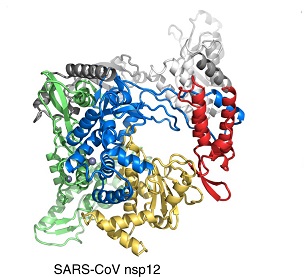Study Uncovers That SARS-CoV-2 NSP12 Proteins Play A Key Role In Virus Replication And Splicing Regulation
SARS-CoV-2 Research - NSP12 Apr 29, 2023 1 year, 11 months, 3 weeks, 17 hours, 20 minutes ago
SARS-CoV-2 Research: A new study by researchers from West China Hospital of Sichuan University, China has found that the SARS-CoV-2 NSP12 proteins plays a critical role in virus replication and splicing regulation.

SARS-CoV-2, the virus responsible for the COVID-19 pandemic, is a highly infectious pathogen that has mutated into highly transmissible variants, such as the Omicron strain. Understanding the mechanisms behind the virus's replication and interaction with the host is crucial for developing effective treatments. A key enzyme involved in the replication of RNA viruses, including SARS-CoV-2, is the RNA-dependent RNA polymerase (RdRp). This enzyme has been extensively studied, but the precise molecular mechanisms behind its catalytic subunit NSP12 remain unclear.
This new study examined the interactions between SARS-CoV-2 NSP12 and host proteins, focusing on three splicing factors: SLU7, PPIL3, and AKAP8.
The study team used various assays and microscopy techniques to explore these interactions and their impact on virus replication and splicing regulation.
Splicing is a critical process in gene expression, involving the removal of introns and ligation of exons to create a mature mRNA molecule. This process is carried out by the spliceosome, a complex machinery composed of small nuclear ribonucleoprotein particles (U snRNPs) and non-snRNP associated proteins. Two types of splicing occur: constitutive and alternative splicing (AS), with the latter regulated by splicing factors like SLU7, PPIL3, and AKAP8.
The
SARS-CoV-2 Research findings showed that NSP12 interacted with various host proteins, including the three splicing factors mentioned above. These interactions influenced the polymerase activity of SARS-CoV-2 RdRp and the virus's entry into host cells.
Additionally, NSP12 and its homologues from SARS-CoV and MERS-CoV were shown to inhibit cellular alternative splicing or AS, which was affected by the three splicing factors.
These study findings provide insights into how SARS-CoV-2 interacts with host proteins and modulates splicing to promote viral replication. While the virus's genome replication and transcription occur in the cytoplasm, the interactions between NSP12 and host proteins may still significantly impact the virus's life cycle and pathogenesis.
The study also showed that SLU7, PPIL3, and AKAP8 influenced the stability of RdRp, suggesting that their effects on RdRp's polymerase activity might be due to changes in the enzyme's stability or assembly efficiency. Moreover, knocking out SLU7, PPIL3, or AKAP8 resulted in a decrease in the entry efficiency of SARS-CoV-2 pseudovirus into host cells, likely due to changes in the expression of genes related to viral infection.
Interestingly, NSP12 was found to repress cellular AS, and its regulation of AS was influenced by the three splicing factors. This suggests that NSP12 might interact with these host proteins to affect their functions, ultimately regulating cellular AS. However, more experimental evidence is needed to support this hypothesis.
To conclude, the study findings corroborate the hypothesis that SARS-CoV-2's NSP12 employs three splicing factors (SLU7, PP
IL3, and AKAP8) to control viral entry, replication, and cellular AS. This could be a shared mechanism among human coronaviruses, as indicated by the examination of NSP12 analogs. In this proposed model, SLU7 or PPIL3 regulate the transcription and AS of specific host genes implicated in viral entry during infection, potentially promoting viral infiltration. Following viral entry, RdRp primarily carries out viral RNA replication in the cytoplasm. Its stability or assembly efficacy is directly or indirectly influenced by SLU7, PPIL3, or AKAP8, which in turn impacts RdRp's polymerase activity and SARS-CoV-2 replication. Moreover, a portion of NSP12 enters the nucleus and interacts with the three splicing factors (SLU7, PPIL3, and AKAP8), possibly disrupting the yet-to-be identified attributes or functions of these host proteins, eventually suppressing cellular AS. This may facilitate viral replication and pathogenesis. Nevertheless, the precise rationale behind NSP12's regulation of cellular AS remains uncertain and warrants further exploration. Our research not only unveils a previously unknown role for human coronavirus NSP12 as a splicing regulator but also offers valuable insights into the interactions between human coronaviruses and their host organisms. This knowledge could potentially pave the way for the creation of antiviral strategies targeting NSP12-mediated splicing regulation.
The study findings were published on a preprint server and are currently being peer reviewed.
https://www.researchsquare.com/article/rs-2853386/v1
For the latest
SARS-CoV-2 Research, keep on logging to Thailand Medical News.
